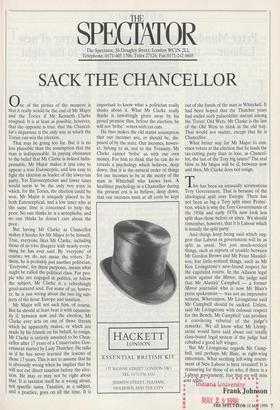The Spectator, 56 Doughty Street, London WC1N 2LL Telephone: 0171-405
1706; Telex 27124; Fax 0171-242 0603
SACK THE CHANCELLOR
One of the pieties of the moment is that it really would be the end of Mr Major and the Tories if Mr Kenneth Clarke resigned. It is at least as possible, however, that the opposite is true: that the Chancel- lor's departure is the only way in which the Tories can win the election.
That may be going too far. But it is no less plausible than the assumption that the man is indispensable. In paying obeisance to the belief that Mr Clarke is indeed indis- pensable, Mr Major makes it less easy to appear a true Eurosceptic, and less easy to fight the election as leader of the lower-tax party. Yet Euroscepticism and lower taxes would seem to be the only two ways in which, for the Tories, the election could be won. Mr Major is uniquely placed to be both Eurosceptical, and a low taxer who at the same time is concerned to help the poor. No one thinks he is a xenophobe, and no one thinks he doesn't care about the poor.
But having Mr Clarke as Chancellor makes it harder for Mr Major to be himself. True, everyone likes Mr Clarke, including those of us who disagree with nearly every- thing he has ever said. By 'everyone' of course, we do not mean the voters. To them, he is probably just another politician. `Everyone', for these purposes, means what might be called the political class. For peo- ple who are engaged in politics, or follow the subject, Mr Clarke is a refreshingly good-natured soul. For some of us, howev- er, he is just wrong about the two big sub- jects of the hour: Europe and taxation.
Mr Major will not sack him, of course. But he should at least bear it with equanim- ity if, between now and the election, Mr Clarke ever acts on one of those threats which he apparently makes, or which are made by his friends on his behalf, to resign. Mr Clarke is entirely unsuited to be Chan- cellor after 17 years of a Conservative Gov- ernment started by Lady Thatcher. He talks as if he has never learned the lessons of those 17 years. This is not to assume that he is obviously wrong when he implies that he will not cut direct taxation before the elec- tion. He may or may not be right about that. It is taxation itself he is wrong about, not specific taxes. Taxation, as a subject, and a practice, goes on all the time. It is important to know what a politician really thinks about it. What Mr Clarke really thinks is unwittingly given away by his proud promise that, before the election, he will not 'bribe' voters with tax cuts.
He thus makes the old statist assumption that our incomes are, or should be, dis- posed of by the state. Our incomes, howev- er, belong to us, not to the Treasury. Mr Clarke cannot 'bribe' us with our own money. For him to think that he can do so reveals a psychology which believes, deep down, that it is the natural order of things for our incomes to be at the mercy of the man in Whitehall who knows best. A healthier psychology in a Chancellor during the present era is to believe, deep down, that our incomes must at all costs be kept out of the hands of the man in Whitehall. It had been hoped that the Thatcher years had ended such palaeolithic statism among the Tories' Old Wets. Mr Clarke is the last of the Old Wets to think in the old way. That would not matter, except that he is Chancellor.
What better way for Mr Major to con- vince voters at the election that he leads the tax-cutting party than to lose, as Chancel- lor, the last of the Tory big taxers? The real blow to Mr Major will be if, between now and then, Mr Clarke does not resign.
This has been an unusually acrimonious Tory Government. That is because of the ideological split over Europe. There has not been so big a Tory split since Protec- tion, which is why the Tory Governments of the 1950s and early 1970s now look less split than those before or since. We should remember, however, that it is Labour which is usually the split party.
And things keep being said which sug- gest that Labour in government will be as split as usual. Not just much-noticed things, such as reports of trouble between Mr Gordon Brown and Mr Peter Mandel- son, but little-noticed things, such as Mr Ken Livingstone's new-found respect for the capitalist courts. In the Allason legal action against the Mirror, the judge said that Mr Alastair Campbell — a former Mirror journalist who is now Mr Blair's press spokesman — was not an impressive witness. Whereupon, Mr Livingstone said Mr Campbell should be sacked. Unless, said Mr Livingstone with colossal respect for the Bench, Mr Campbell 'can produce a convincing rebuttal of the judge's remarks'. We all know what Mr Living- stone would have said about our totally class-based legal system if the judge had rebuked a good left winger.
But Mr Livingstone regards Mr Camp- bell, and perhaps Mr Blair, as right-wing extremists. What seething left-wing resent- ment of New Labour is here revealed! It is reassuring for those of us who, if there is a .1.4b.oir zovirnment, fear that we will miss . • • • • • • • 'our splits.
• J ohnt on


































































 Previous page
Previous page